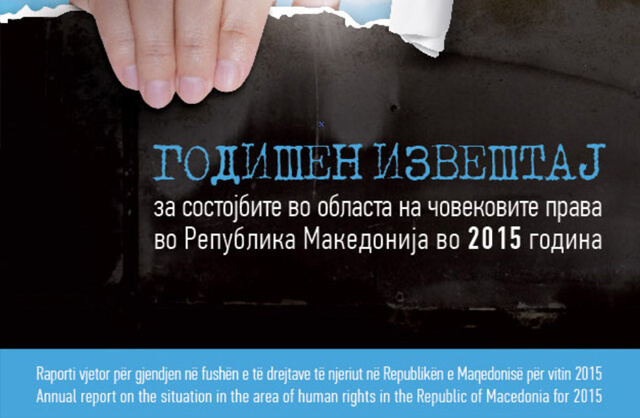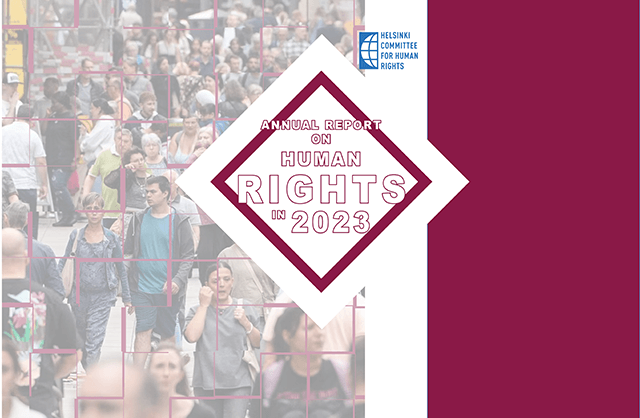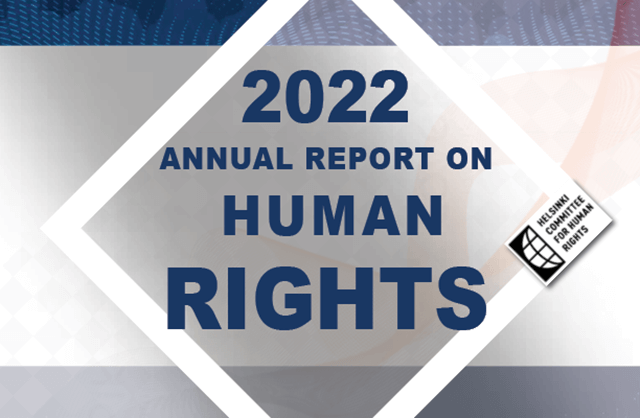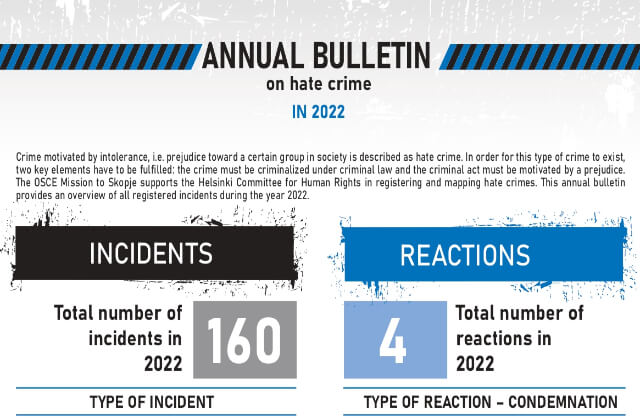Annual report on human rights in 2015
April 1, 2016

A central topic in the annual report of the Helsinki Committee is the intense political crisis that marked 2015, which summarizes the analyses of the established human rights situation in several areas.
Since the beginning of the year, the opposition has been publishing conversations between senior government officials and has reported that more than 20,000 citizens, including journalists, human rights activists, and civil society representatives, have been wiretapped by the government. This act of mass wiretapping is a violation of human rights of the highest degree and absolute abuse of the opportunity to intercept communications, which endangers the rule of law in the country. During the year, many public gatherings were organized so people could express their revolt against the policies of the current governing structure. Namely, encouraged by their constitutionally guaranteed freedom of public assembly and other various reasons, the Macedonian citizens pointed out to the systematic violation of human rights and freedoms in the country in almost all segments of society. Media freedom, university autonomy, labour rights, police brutality, the rights of the LGBTI community members – these were just some of the topics around which the civil revolt was consolidated, i.e. the pressure through which the citizens got involved in the political decision-making process. The Helsinki Committee for Human Rights concluded that the actions of the police during some of the public gatherings were characterized by the use of disproportionate use of force and coercive measures.
As one of the few organizations in the Republic of Macedonia that has a long-standing and continuous experience in monitoring court proceedings, it observed 50 court proceedings in criminal and civil matters during 2015. The general conclusion is that there are still systemic problems that the judiciary fails to overcome, overcomes too slowly, or deepens them. The basic problems arise in the insufficient independence of the judiciary through interference of the executive in the judiciary; insufficient expertise and training of judges; non-transparency in the work of the courts; inconsistency of court practice; unequal treatment of citizens versus state bodies when they appear as clients in proceedings; and the lack of effective legal protection, especially through access to justice, violation of the right to a fair trial, and the presumption of innocence.
Regarding the constitutional and legislative matter, the Annual Report analyzes the Law on the Fact-Finding Council and the initiation of a proceeding for determining the responsibility of a judge, as well as the unconstitutional election of a Minister of Internal Affairs.
Following the situation with the closed institutions and the police actions in 2015, the Helsinki Committee concludes that no progress has been noticed neither in the protection of the rights of the people accommodated in penitentiaries during this year, nor in the actions of the police. On the contrary, we are witnessing a systematic violation of the rights, physical integrity, and dignity of the citizens by the state bodies. Although the Helsinki Committee’s access to prisons is still a problem, information on conditions and treatment was obtained through prisoners who contacted the Helsinki Committee for legal aid. Prisons and psychiatric facilities face substandard living conditions, contrary to many international and domestic documents. One of the main problems that has persisted for many years is overcrowding, which threatens privacy and at the same time violates the dignity of the people, leading to cruel and inhumane living conditions in penitentiaries.
The Helsinki Committee for Human Rights actively monitored the situation with discrimination in the Republic of Macedonia during 2015 through monitoring of court proceedings initiated for non-discrimination, through complaints received by citizens who were victims of discrimination, and through proceedings before equality bodies and courts. Moreover, the Helsinki Committee, together with other members of the Network for Protection against Discrimination, submitted a Shadow Report on Discrimination against the Roma to the Committee on the Elimination of Racial Discrimination, part of the United Nations, which found violations of Roma rights and discrimination in several areas, and gave recommendations for overcoming them. Despite the fact that five years have passed since the implementation of the Law on Prevention of and Protection against Discrimination and the establishment of the Commission, there is still no talk of effective protection in the area of discrimination, especially when it comes to marginalized groups.
During the year, the Committee monitored and documented the situation with hate speech in all spheres of society. The monitoring was carried out through several methods, i.e. through reported events on the platform www.govornaomraza.mk (established in 2014), through daily monitoring of social networks, Internet portals, and other public space, as well as through statistics from the competent state bodies for prosecuting and dealing with hate speech. During 2015, 33 cases of hate speech were reported; the most common grounds for reported cases of hate speech are sexual orientation and gender identity in the first place, ethnic and religious affiliation in the second, and political affiliation appears as the third most common basis for hate speech. During the same period, the Helsinki Committee registered 44 hate crimes. Compared to the incidents registered in 2013 and 2014, the biggest difference is related to the victims, most of whom are refugees.
In 2015, the Helsinki Committee registered a large number of complaints for violation of economic and social rights, which is mainly due to the high unemployment rate in the country, the impoverishment of the population, and violations of labour, social, and health rights. The general conclusion is that the Health Insurance Fund of the Republic of Macedonia and the Ministry of Health do not act in accordance with the positive legal regulations and do not respect the legal deadlines for creating decisions, and such inaction directly threatens citizens’ rights contained in the Law on Health and the Law on Health Insurance. Social work centres, as public service for the citizens fail in their work, especially when it comes to facilitating the access to exercising citizens’ social rights who are at social risk.
During the year, the Helsinki Committee registered five new cases of femicide – homicides against women by current or former spouses or intimate partners. The Helsinki Committee recalls with concern that the large number of cases of gender-based violence and domestic violence continues, cases that resulted in deaths in the past two years continues.
The year also marked the refugee crisis. At the end of 2014 and the beginning of 2015, Macedonia witnessed an unprecedented entry of refugees transiting through the territory of the country to the member states of the European Union. From the beginning of the state registration in June 2015 until the end of the year, about 390,000 refugees were registered. Unfortunately, the state underestimated the refugee crisis and started preparations for organized reception too late, which resulted in a number of violations of refugee rights.


